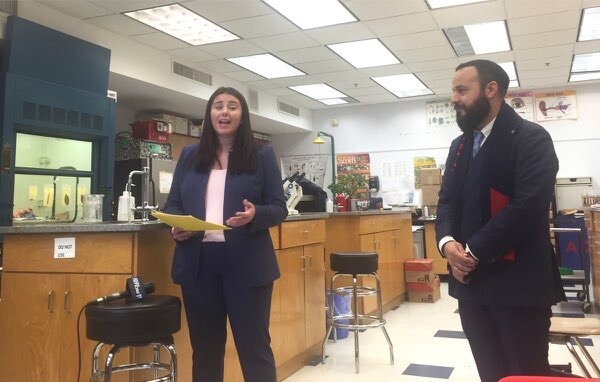By Patrick Donachie
A national organization of pharmaceutical firms throughout the country granted $2,000 to a Jackson Heights charter school to help bolster the school’s Science, Technology, Engineering and Math programs.
State Assemblyman Francisco Moya (D-Jackson Heights) was on hand to celebrate the new funding, along with Stacey Gauthier, the principal of Renaissance Charter School, and representatives from the Pharmaceutical Research and Manufacturers of America (PhRMA).
“It can really lead to a better and brighter future for all of you. This will definitely be the next wave of jobs that will be able to establish our communities, especially in communities of color,” Moya said during the announcement. “Pay attention, because this could be a wonderful future for one of you here. You can be the next Steve Jobs. You could be sitting here in this room right now, and we just don’t know it.”
Gauthier said the school, located at 35-59 81st St., was opened in 1993 and had been a charter since 2000. The school was increasingly offering more hands-on learning in STEM fields, she said.
“We realized in order to get kids interested in science meaningfully you had to start early,” she said, citing new programs in urban farming, geology and expanded programs for coding. “How do you get kids who aren’t in specialized schools to think about these careers? We know the Brooklyn Tech kids might think about them, but what about the kids here?”
Gauthier said the new grant funding would go toward strengthening and expanding STEM opportunities in the school, something that was of great interest to PhRMA, according to Laura Perloff, the organization’s director of Advocacy and Strategic Alliances.
“To bring these new medicines to patients, we need well-educated and highly skilled people, especially in the STEM fields, but pharmaceutical companies often have more jobs available than people who are able to fill them,” she said. “And that’s because there aren’t enough people educated in the areas that we need. To find the next cure, we’ll need men and women just like you in our plants, in our labs and on our team.”
Perloff said PhRMA had spent more than $100 million on STEM programs across the country, reaching about 1.5 million students and 17,000 teachers. Perloff said PhRMA was investing money now in order to stave off potential issues in the years to come.
“There’s clearly a gap that is coming in terms of workforce development,” she said. “Ultimately, American students are less likely to further STEM education in college.”
A 2014 report completed by PhRMA found that about 600,000 manufacturing jobs in the United States are not filled because there are not enough qualified candidates for the jobs, and Perloff wanted to stress to students that opportunities were plentiful.
“Before they’re seniors in high school, let’s cultivate them,” she said. “You don’t have to be a doctor or a researcher to make a difference.”
Reach reporter Patrick Donachie by e-mail at pdona



































